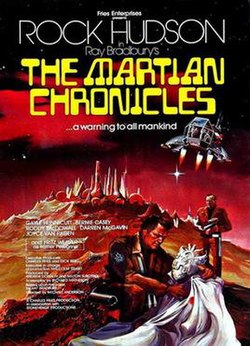The Martian Chronicles (miniseries)
| The Martian Chronicles | |
|---|---|
 |
|
| Written by | Richard Matheson |
| Directed by | Michael Anderson |
| Starring |
Rock Hudson Roddy McDowall Maria Schell |
| Composer(s) | Stanley Myers |
| Country of origin | United States United Kingdom |
| No. of episodes | 3 (list of episodes) |
| Production | |
| Producer(s) |
Milton Subotsky Andrew Donally |
| Running time | 97 min each episode (Without commercials) |
| Release | |
| Original release | 27 January – 29 January 1980 |
The Martian Chronicles is a television miniseries based on Ray Bradbury's The Martian Chronicles and dealing with the exploration of Mars and the inhabitants there. The series starred Rock Hudson, Darren McGavin, Bernadette Peters, Roddy McDowall, Fritz Weaver, Barry Morse, and Maria Schell. It was aired on NBC in January 1980 in three episodes with a total running time of just over four hours (nearly five hours on the DVD version).
Bradbury found the miniseries "just boring".
The script (by Richard Matheson) differs significantly from Bradbury's original novel from the 1940s; see episode summary below.
The first episode starts at the scene of Viking 1 unmanned probe landing on the surface of the planet Mars in July 1976. A narrator explains that the purpose of the probe is to determine whether Mars is inhabited. As the narrator is speaking, the viewer becomes aware that there are two viewpoints at NASA amongst the scientists who launched the probe: One group obviously believes Mars is uninhabited, the other is open to the possibility of indigenous life on the planet. Each has their convincing arguments, but ultimately the probe indicates that Mars does not harbour life. At the close of the scene the camera pans back to show a larger view of the probe's landing area, with what appears to be indigenous Martian settlements in the surrounding terrain, with the narrator noting that, "If the probe had landed just a few miles further on, things might have been different." Afterwards the opening credits roll.
The next scene places the viewer at the Kennedy Space Center in January 1999 when the first "Zeus I" manned spacecraft to Mars is carried into orbit by a Saturn V rocket. The Zeus project represents the beginning of a major effort by NASA and NATO to explore and eventually colonize the outer planets.
...
Wikipedia
